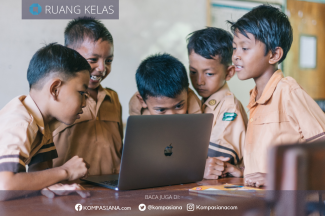Among the nations determined to reach net zero emissions (NZE) by 2060 or before is Indonesia. A nation is said to be in net zero emissions (NZE) if its greenhouse gas (GHG) emissions are equal to the amount of GHG absorbed by the environment or by carbon capture technologies. In keeping with the objectives of the 2015 Paris Agreement, Indonesia may support international efforts to keep the earth's average temperature from rising by more than 1.5C by attaining NZE.
Indonesia needs national energy policy guidelines and policies that facilitate the switch from fossil fuels to new and renewable energy sources (EBT) in order to attain NZE. The energy transition is a shift toward more efficient, sustainable, and ecologically friendly methods of energy generation, delivery, and consumption. For Indonesians, the energy shift may also have positive effects on their social, economic, and health conditions.
The orientation of national energy policy towards NZE is based on five main principles, namely:
- Expanding the use of NRE, including geothermal, biomass, solar, wind, and water power. Although not fully utilized, EBT has a lot of promise in Indonesia. The EBT mix is intended to reach 23% in 2025, 57% in 2030, and 71% in 2040, according to the government.
- Lowering reliance on fossil fuels including coal, oil, and gas. Despite being the main contributor to GHG emissions in Indonesia, fossil fuels continue to dominate the country's energy mix. To cut down on the use of fossil fuels, the government intends to halt developing new coal-fired power plants, retire existing coal-fired power plants early, and enact carbon taxes and trading.
- Transportation-related electric cars. After manufacturing, the transportation sector in Indonesia uses the most energy. In place of traditional oil fueled motorized vehicles, the government is promoting the development and use of electric cars and motorcycles. By 2030, the government wanted to see 2 million cars and 13 million motorcycles sold as electric vehicles.
- A rise in the consumption of power in businesses and homes. Primary energy in the form of electricity is useful for a variety of tasks, including engines, furnaces, heating, and cooling. To increase the efficiency, quality, and accessibility of power, the government is building smart grids, smart meters, and connections. The adoption of LED lighting, electric stoves, and other energy-saving appliances in homes and businesses is also encouraged by the government.
- Utilization of Carbon Capture and Storage (CCS). CO2 produced by industry or power plants can be captured, compressed, transported, and stored using CCS technology. CCS can aid in achieving NZE by lowering GHG emissions that reach the atmosphere. The government intends to develop CCS in a number of regions, including Papua, East Java, and South Sumatra.
National energy policy regulations towards NZE are outlined in various regulations and plans, including:
- The Economic Value of Carbon is governed by Presidential Regulation No. 98 of 2021. This law governs how the economic value of carbon is calculated, managed, and applied to encourage and discourage business actors and the public from cutting greenhouse gas emissions.
- The 2021 Law No. 7 on the Harmonization of Tax Laws. This law governs the supply of tax benefits, such as import duties, value-added tax exemptions or reductions, for the development of electronic banking.
- Rooftop PLTS: Minister of Energy and Mineral Resources Regulation No. 26 of 2021. The methods, specifications, and practices for setting up, running, and maintaining rooftop PLTS on buildings are governed by this rule. Installed on a building's roof, rooftop photovoltaic systems (PLTS) generate electricity for the building itself and can also be used to sell excess power to PLN.
- The Minister of Energy and Mineral Resources issued a decree pertaining to the 2021--2030 General Plan for Electricity Supply (RUPTL). Plans for the advancement of electricity generation, transmission, and distribution over the next ten years are governed by this decision. According to RUPTL 2021--2030, by 2030, there will be more installed capacity of EBT than fossil energy, specifically 56.4% EBT and 43.6% fossil energy.
- The 2022--2050 General National Energy Plan (RUEN). The National Energy Council (DEN) created RUEN, a long-term national energy planning document. The direction of policies, strategies, initiatives, and goals for reaching NZE by 2060 will be governed by RUEN 2022--2050.
It is hoped that Indonesia can reach NZE by 2060 or earlier with the developed national energy policy focus and laws. The ecology, the economy, and the welfare of the Indonesian people will all benefit from this. Nonetheless, in order to achieve NZE, cooperation and engagement from all stakeholders---including the public, academia, business community, government, and civil society---are required.
Baca konten-konten menarik Kompasiana langsung dari smartphone kamu. Follow channel WhatsApp Kompasiana sekarang di sini: https://whatsapp.com/channel/0029VaYjYaL4Spk7WflFYJ2H
